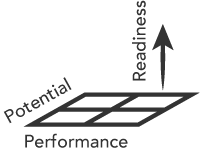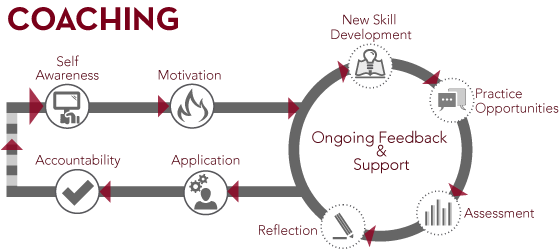Have you ever witnessed a once productive and enthusiastic employee becoming detached or complacent? Or someone being promoted into a role they weren’t ready for?
Feedback and Coaching Module

Your success as a supervisor depends on your ability to provide feedback and coaching in ways that support current performance, develop potential, and ensure that people are ready for the roles and assignments you give them. Your approach will be different, depending on where the employee is on the Performance-Potential-Readiness grid.
Review Quick Guide

- What it is?
- When is it appropriate to assess Performance, Potential and Readiness?
- What does it look like?
- What's next?
Assessing Performance, Potential, and Readiness Quick Guide
Apply: Practice Scenarios
Need to practice? Work through the scenarios below to see how would you assess Performance, Potential and Readiness.





Feedback is information communicated for the purpose of helping another person modify their behavior to improve learning and performance. Follow the Get Ready, Get Set, Go framework described below to provide effective feedback.

Review Quick Guide
- Why should you give feedback?
- How to prepare to make feedback effective?
- What are the next steps?
Apply What You've Learned
Work through eight different examples to see if you can spot the ingredients of effective and ineffective feedback.
Coaching is equipping people with the tools, knowledge, and opportunities they need to develop themselves and become more effective.
David Peterson, PhD Psychology, University of Minnesota
Coaching helps people reach a high level of performance, realize their potential, and stay engaged in important work. It also helps retain motivated, talented and skilled people. Take a look at the materials below to learn what coaching components look like in real life and what questions you need to be asking to help guide others to be more effective.

Review Quick Guide
- What does self-awareness look like?
- How to improve employee motivation?
- What tools can I use to help my employees achieve their goals?
Apply What You've Learned
Coaching people to be more effective is no easy task. Work though some questions and examples to see if you learned how to focus your effort and make the coaching process more effective.
You have completed this module
Congratulations! You have completed this online module. The following are module materials and related resources. We encourage you to explore other online modules to continue your supervisory development journey.
- Anseel, F., Beatty, A. S., Shen, W., Lievens, F., Sackett, P. R. (2015). How are we doing after 30 years? A meta-analytic review of the antecedents and outcomes of feedback-seeking behavior. Journal of Management, 41, 318-348.
- Bullock, R. (2013, August 6). When Feedback Attacks!! (when, how, and why feedback can hurt performance). Retrieved February 6, 2017, from When Feedback Attacks!! (when, how, and why feedback can hurt performance)
- Jenson, C. (2016). Is Workplace Coaching a Generic or Goal Specific Intervention? An Examination of Predictors of Goal Progress in Workplace Coaching Engagements (Doctoral dissertation).
- Kluger, A. N. & DeNisi, A. (1996). The effects of feedback interventions on performance: A historical review, a meta-analysis, and a preliminary feedback intervention theory. Psychological Bulletin, 119, 254-284.
- Shute, V. J. (2008). Focus on formative feedback. Review of Educational Research, 78, 153-189.
- Schwarz, R. (2017, October 30). The "Sandwich Approach" Undermines Your Feedback.
Recommended Reading
- Bono, J. E., Purvanova, R. K., Towler, A. J., & Peterson, D. B. (2009), A survey of executive coaching practices. Personnel Psychology, 62, 361-404.
- Marc, E. (2014, July 24). The Hard Truth about Effective Performance Management.
- Fishbach, A., & Finkelstein, S. R. (2012). How feedback influences persistence, disengagement, and change in goal pursuit. In H. Aarts & A. J. Elliot (Eds.), Goal-directed behavior (pp. 203-230). New York: Psychology Press.
- Garvin, D. A. (2013). How Google sold its engineers on management: Hint: it’s all about the data. Harvard Business Review, 91, 74-82.
- Giving Effective Feedback: Check in regularly, handle tough conversations, bring out the best (2014). Boston: Harvard Business School Publishing Corp.
- Mangels, J.A., Good, C., Whiteman, R.C., Maniscalco, B., and Dweck, C.S. (2011). Emotion blocks the path to learning understanding stereotype threat. Social cognitive and affective neuroscience advance access. Oxford University Press.
- Martin, J. & Schmidt, C. (2010). How to keep your top talent. Harvard Business Review, 88, 54-61. Conference Board. (2005).
- Peterson, D.B. (2008). High-potential, high risk. HR Magazine, 53, 85-87.
- Rockquemore, K., PhD. (2018, January 22). Is Balance a Myth? The Monday Motivator.
- Silzer, R.F., & Church, A. (2009). The pearls and perils of identifying potential. Industrial and Organizational Psychology, 2, 377-412.
- Weitzel, S. R. (2000). Feedback that works: How to build and deliver your message. Greensboro, North Carolina: Center for Creative Leadership.
Additional References
- Peterson, D. B. (2002), PDI. Management development; coaching and mentoring programs, from: Kraiger, K. (Ed.) (2002). Creating, implementing, and managing effective training and development. San Francisco: Jossey-Bass
- DiGirolamo, J. Coaching for professional development (2015), SHRM-SIOP Science of HR White Paper Series.
- HBR guide to coaching your employees: Ask before you tell, tailor your feedback, foster steady growth.
- Kreamer, A. (2013, January 03). How to Handle Tears at Work.
- Groysberg, B. & Abrahams, R. (2015). The whys and hows of feedback. Harvard Business School class discussion note.
- Hicks, M.D. & Peterson, D.B. (1999). The development pipeline. Knowledge Management Review, July-August 1999.
- Riddle, D., Truth and courage: Implementing a coaching culture (2016), CCL white paper.
HBR Blogs (hbr.org)
- Batista, E. Building a feedback-rich culture, Harvard Business Review blog (December 24, 2013).
- Phoel, C.M. Feedback that works, Harvard Business Review blog (April 27, 2009).
- Pozen, R.C. The delicate art of giving feedback, Harvard Business Review blog (March 28, 2013).
- Weintraub, J. R. & Hunt, J. M. Four reasons managers should spend more time on coaching, Harvard Business Review blog (May 29, 2015).